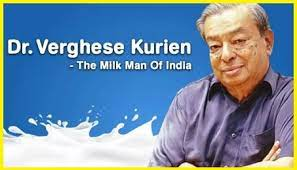National Milk Day | 26 Nov 2022
For Prelims: National Milk Day, White Revolution of India, Operation Flood, Animal Husbandry Infrastructure Development Fund (AHIDF), National Animal Disease Control Programme, Rashtriya Gokul Mission, National Artificial Insemination Programme, National Livestock Mission
For Mains: Role of dairy and livestock sector in Indian economy, Related issues and Initiatives taken to promote the sector.
Why in News?
Department of Animal Husbandry is celebrating National Milk Day on 26th November 2022.
- National Gopal Ratna Awards 2022 are conferred as part of the celebrations.
- Animal Quarantine Certification Services are also to be inaugurated.
- June 1 is observed as World Milk Day every year.
What is National Milk Day?
- The day celebrates the importance of milk in a person’s life. And to promote the benefits related to the milk & milk industry and to create awareness among people about the importance of milk and milk products.
- 26th November 2022 commemorates 101st birth anniversary of Dr. Verghese Kurien, the “Father of White Revolution in India”.
- Dr. Verghese Kurien (1921-2012):
- He is known as the ‘Father of White Revolution in India’.
- He is famous for his ‘Operation Flood’, which is known as the world’s largest agricultural program.
- He established 30 institutions that are run by various farmers and workers.

- He also played a key role in the establishment and success of Amul Brand.
- Because of his efforts only, India became the largest producer of milk in 1998, surpassing the U.S.
- He also helped manage the Delhi Milk Scheme and corrected the prices. He also helped India become self-sufficient in edible oils.
- He was honoured with several awards, including the Ramon Magsaysay Award (1963), Krishi Ratna (1986) and World Food Prize (1989).
- He is also the recipient of India's highest civilian awards- Padma Shri (1965), Padma Bhushan (1966) and Padma Vibhushan (1999).
What was White Revolution of India?
- About:
- Operation Flood was launched on 13th January, 1970. It was the world's largest dairy development programme.
- Within 30 years, the operation helped double milk available per person in India, making dairy farming India's largest self-sustainable rural employment generator.
- The operation gave farmers direct control over the resources they create, helping them direct their own development. This was achieved not only by mass production, but by production by the masses. It is also now known as the "White Revolution".
- Phases:
- Phase I (1970-1980): This phase was financed by the sale of butter oil and skimmed milk powder donated by the European Union through the World Food Program.
- Phase II (1981 to 1985): During this phase, the number of milk sheds increased from 18 to 136, milk outlets were expanded to about 290 urban markets, a self-sustaining system was set up that included 4,250,000 milk producers spread across 43,000 village cooperatives.
- Phase III (1985-1996): This phase enabled the dairy cooperatives to expand and gave a finishing touch to the programme. It also strengthened the infrastructure required to procure and market increasing volumes of milk.
- Objectives:
- Increase milk production ("a flood of milk").
- Increase rural incomes.
- Reasonable prices for consumers.
- Significance:
- It helped dairy farmers direct their own development, placing control of the resources they create in their own hands.
- It has helped India become the largest producer of milk in the world in 2016-17.
- Currently, India is the world's largest milk producer, with 22% of global production.
- Related Initiatives:
UPSC Civil Services Examination, Previous Year Question (PYQ)
Mains
Q. Explain various types of revolutions, took place in Agriculture after Independence in India. How these revolutions have helped in poverty alleviation and food security in India? (2017)
